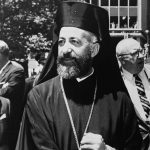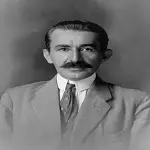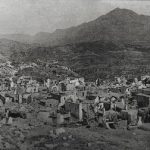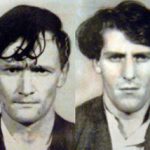 1898 – Carl Gustav Witt discovers 433 Eros, the first asteroid to be found near Earth. Eros, the temporary designation 1898 DQ, is a stony and elongated asteroid of the Amor group and the first discovered object and the second largest near Earth with an average diameter of approximately 16.8 kilometers. He was titled Eros.
1898 – Carl Gustav Witt discovers 433 Eros, the first asteroid to be found near Earth. Eros, the temporary designation 1898 DQ, is a stony and elongated asteroid of the Amor group and the first discovered object and the second largest near Earth with an average diameter of approximately 16.8 kilometers. He was titled Eros.
 1913 – Born in Paphos, Makarios III. Makarios, was a Greek Cypriot clergyman and politician who served as Archbishop and Primate of the Autocephalous Church of Cyprus (1950-1977) and as the first President of Cyprus (1960-1977). In his three terms as president he survived four assassination attempts as well as a coup.
1913 – Born in Paphos, Makarios III. Makarios, was a Greek Cypriot clergyman and politician who served as Archbishop and Primate of the Autocephalous Church of Cyprus (1950-1977) and as the first President of Cyprus (1960-1977). In his three terms as president he survived four assassination attempts as well as a coup.
 1933 – Hasan bey Prishtina died, he was an Albanian politician in the Ottoman Empire, among the leaders of several uprisings, during the Ottoman parliamentary period, causing the 1912 Uprising to gain the autonomy of the Albanian Province. The Balkan War did not allow his achievement to last long, and after the independence of Albania he was appointed a minister in the first government and then prime minister. It is claimed that there have been four attempts to assassinate Pristina. He cooperated with different currents and states against Zog, and even organized many assassinations against him. For such an assassination attempt, he was sentenced to death in absentia on June 6, 1933, along with 7 other political fugitives. In the diary of the consular services of the Kingdom of Albania from 1933, all the movements of Hasan Pristina are recorded: on January 10 he was in Vienna, on March 16 in Bucharest, on April 1 in Sofia, on April 11 in Thessaloniki, on May 1 in Istanbul, June 1 in Vienna, June 6 in Budapest, June 23 in Vienna, June 30 in Istanbul and July 1, 1933 in Thessaloniki. Consul Qemal Mesareja reported that Prishtina had left his brother Ymer’s house and settled in the “Astoria” hotel. Until the 60s, he was considered a traitor in Albanian history texts, but then he was rehabilitated. On December 6, 1977, the reburial ceremony of his remains took place in the city of Kukës.
1933 – Hasan bey Prishtina died, he was an Albanian politician in the Ottoman Empire, among the leaders of several uprisings, during the Ottoman parliamentary period, causing the 1912 Uprising to gain the autonomy of the Albanian Province. The Balkan War did not allow his achievement to last long, and after the independence of Albania he was appointed a minister in the first government and then prime minister. It is claimed that there have been four attempts to assassinate Pristina. He cooperated with different currents and states against Zog, and even organized many assassinations against him. For such an assassination attempt, he was sentenced to death in absentia on June 6, 1933, along with 7 other political fugitives. In the diary of the consular services of the Kingdom of Albania from 1933, all the movements of Hasan Pristina are recorded: on January 10 he was in Vienna, on March 16 in Bucharest, on April 1 in Sofia, on April 11 in Thessaloniki, on May 1 in Istanbul, June 1 in Vienna, June 6 in Budapest, June 23 in Vienna, June 30 in Istanbul and July 1, 1933 in Thessaloniki. Consul Qemal Mesareja reported that Prishtina had left his brother Ymer’s house and settled in the “Astoria” hotel. Until the 60s, he was considered a traitor in Albanian history texts, but then he was rehabilitated. On December 6, 1977, the reburial ceremony of his remains took place in the city of Kukës.
 1944 – During World War II, German troops begin looting and destroying Anogenia in Crete that would continue until September 5th. This was the third time that Anogeneia was destroyed, after the Ottomans had destroyed it twice, first in July 1822 and again in November 1867, during the Great Cretan Revolution.
1944 – During World War II, German troops begin looting and destroying Anogenia in Crete that would continue until September 5th. This was the third time that Anogeneia was destroyed, after the Ottomans had destroyed it twice, first in July 1822 and again in November 1867, during the Great Cretan Revolution.
 1946 – Herbert George Wells dies at the age of 79. Wells, was an English writer. Prolitic in many genres, he wrote dozens of novels, short stories and works of social commentary, history, satire, biography and autobiography. Wells is best remembered for his science fiction novels and is often referred to as the “father of science fiction”.
1946 – Herbert George Wells dies at the age of 79. Wells, was an English writer. Prolitic in many genres, he wrote dozens of novels, short stories and works of social commentary, history, satire, biography and autobiography. Wells is best remembered for his science fiction novels and is often referred to as the “father of science fiction”.
 1961 – East Germany closes the border between the eastern and western sectors of Berlin to quell its inhabitants’ attempts to escape to the West, and in the meantime, the construction of the Berlin Wall begins. The Berlin Wall was a concrete barrier that physically and ideologically divided Berlin from 1961 to 1989.
1961 – East Germany closes the border between the eastern and western sectors of Berlin to quell its inhabitants’ attempts to escape to the West, and in the meantime, the construction of the Berlin Wall begins. The Berlin Wall was a concrete barrier that physically and ideologically divided Berlin from 1961 to 1989.
 1964 – Peter Allen and Gwynne Evans are hanged for the murder of John Alan West becoming the last people executed in the UK. West was a 53-year-old van driver who was killed by Gwynne Evans and Peter Allen who had gone to rob him at his home in Seaton, Cumberland.
1964 – Peter Allen and Gwynne Evans are hanged for the murder of John Alan West becoming the last people executed in the UK. West was a 53-year-old van driver who was killed by Gwynne Evans and Peter Allen who had gone to rob him at his home in Seaton, Cumberland.
 1978 – Nearly 200 Palestinians are killed in Beirut in a terrorist attack during the second phase of the Lebanese Civil War. The siege was carried out by Lebanese Christian militias led by the Lebanese Front as part of a wider campaign to oust the Palestinians, especially those linked to the radical wing of the Palestine Liberation Organization.
1978 – Nearly 200 Palestinians are killed in Beirut in a terrorist attack during the second phase of the Lebanese Civil War. The siege was carried out by Lebanese Christian militias led by the Lebanese Front as part of a wider campaign to oust the Palestinians, especially those linked to the radical wing of the Palestine Liberation Organization.
 1980 – Eqrem Çabej dies, he was an Albanian teacher, linguist and albanologist. He graduated from the gymnasium in Klagenfurt (1923-1926), for higher education there was a friction with the intention that his father had set for him to become a doctor. Enrolled in the Faculty of Medicine at the University of Rome. But after insisting on linguistics, he enrolled in Graz for the academic year 1927-1928 and then moved to Vienna (1930-1933), where he attended the classes of Paul Kretschmer, Karl Patsch, Nikolai Trubetzkoy and Norbert Jokl. Under the leadership of Jokli, Çabeji began to have a great interest in the historical development of the Albanian language. In 1933, he submitted his doctoral dissertation on the Italoalbanische Studien (Italian-Albanian Studies). Çabej returned to Albania where he worked as a high school teacher and deputy director of the dormitory “Our Mountains” in Shkodra (1933/34) where he taught Albanian literature. In the school year 1935-’36 Çabej was transferred to the Normal School of Elbasan, where he also stayed for a year. From there he was transferred to the Ministry of Education to deal with the direction of secondary education. Understandably from his attitude, he had not welcomed such an appointment. With a prayer dated 17. 12. 1936, addressed to the Ministry of Education, for health reasons he requested to be transferred by being reappointed professor of literature at the high school of Tirana. In 1947, he was appointed a member of the Institute of Sciences, the predecessor institute of the University of Tirana. From 1952 to 1957, he served as professor of Albanian history and historical phonetics. In 1972, he became a founding member of the Academy of Sciences.
1980 – Eqrem Çabej dies, he was an Albanian teacher, linguist and albanologist. He graduated from the gymnasium in Klagenfurt (1923-1926), for higher education there was a friction with the intention that his father had set for him to become a doctor. Enrolled in the Faculty of Medicine at the University of Rome. But after insisting on linguistics, he enrolled in Graz for the academic year 1927-1928 and then moved to Vienna (1930-1933), where he attended the classes of Paul Kretschmer, Karl Patsch, Nikolai Trubetzkoy and Norbert Jokl. Under the leadership of Jokli, Çabeji began to have a great interest in the historical development of the Albanian language. In 1933, he submitted his doctoral dissertation on the Italoalbanische Studien (Italian-Albanian Studies). Çabej returned to Albania where he worked as a high school teacher and deputy director of the dormitory “Our Mountains” in Shkodra (1933/34) where he taught Albanian literature. In the school year 1935-’36 Çabej was transferred to the Normal School of Elbasan, where he also stayed for a year. From there he was transferred to the Ministry of Education to deal with the direction of secondary education. Understandably from his attitude, he had not welcomed such an appointment. With a prayer dated 17. 12. 1936, addressed to the Ministry of Education, for health reasons he requested to be transferred by being reappointed professor of literature at the high school of Tirana. In 1947, he was appointed a member of the Institute of Sciences, the predecessor institute of the University of Tirana. From 1952 to 1957, he served as professor of Albanian history and historical phonetics. In 1972, he became a founding member of the Academy of Sciences.







